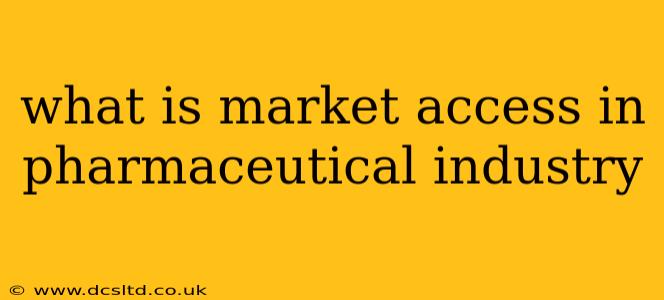Market access in the pharmaceutical industry refers to the process of ensuring that patients have timely and affordable access to needed medicines. It's far more than just getting a drug approved by regulatory bodies like the FDA; it encompasses a complex interplay of factors that determine whether a drug reaches the patients who need it. This includes navigating the intricate landscape of healthcare systems, reimbursement policies, pricing strategies, and clinical pathways. Ultimately, market access is about bridging the gap between drug development and patient care.
What are the key challenges in pharmaceutical market access?
The pharmaceutical industry faces numerous hurdles in achieving optimal market access. These challenges often intertwine and vary significantly depending on the specific drug, the geographic market, and the healthcare system involved. Some of the most significant challenges include:
-
High Drug Prices: The cost of innovative medicines is frequently a major barrier to access. Negotiations with payers (insurance companies, government agencies) are crucial to establish a price that balances the drug's value with affordability.
-
Reimbursement Policies & Formularies: Many healthcare systems use formularies—lists of approved drugs—that dictate which medications are covered by insurance. Getting a drug included on a formulary, often requiring extensive clinical evidence demonstrating its value compared to existing treatments, is a critical step in market access.
-
Regulatory Approvals & Clinical Evidence: Gaining regulatory approval from agencies like the FDA is essential but only the first step. Demonstrating the clinical and cost-effectiveness of a new drug through rigorous clinical trials and real-world evidence is vital for securing reimbursement and market access.
-
Patient Access Programs & Patient Support: Many pharmaceutical companies implement patient access programs to assist patients with navigating insurance coverage, financial assistance, and other barriers to accessing their medications.
-
Competition: The pharmaceutical market is highly competitive. Securing market share and demonstrating the unique value proposition of a new drug, compared to existing alternatives, is essential for success.
-
Healthcare System Variations: Healthcare systems differ significantly across countries and even within countries. Understanding these variations and adapting strategies accordingly is crucial for successful market access.
What are the different stages of market access?
The process of gaining market access is typically broken down into several key stages:
-
Pre-Launch Activities: This stage involves market research, understanding reimbursement policies and pathways, and developing the strategy for interactions with payers and healthcare professionals.
-
Regulatory Approval: This is the official approval by the relevant regulatory agency.
-
Pricing & Reimbursement Negotiation: Discussions with payers to establish a price and secure coverage for the drug.
-
Launch & Market Uptake: The introduction of the drug to the market and monitoring its utilization.
-
Post-Market Surveillance & Value Demonstration: Collecting real-world evidence to demonstrate the continued value and effectiveness of the drug.
How is market access different in different countries?
Market access strategies vary considerably across countries due to differences in healthcare systems, reimbursement mechanisms, and regulatory frameworks. For example, the US system emphasizes private insurance, while many European countries have publicly funded healthcare systems with centralized price negotiation. These differences significantly impact the time, cost, and complexity of market access efforts.
What are some key roles in pharmaceutical market access?
Market access is a team effort involving professionals with diverse expertise. Key roles include:
-
Market Access Managers: Develop and implement market access strategies.
-
Health Economists: Analyze the cost-effectiveness of drugs.
-
Regulatory Affairs Professionals: Navigate regulatory approval processes.
-
Medical Affairs Professionals: Communicate clinical data to healthcare professionals and payers.
Market access is a dynamic and ever-evolving field. Staying abreast of regulatory changes, reimbursement policies, and healthcare trends is critical for successful market access strategies within the pharmaceutical industry.
